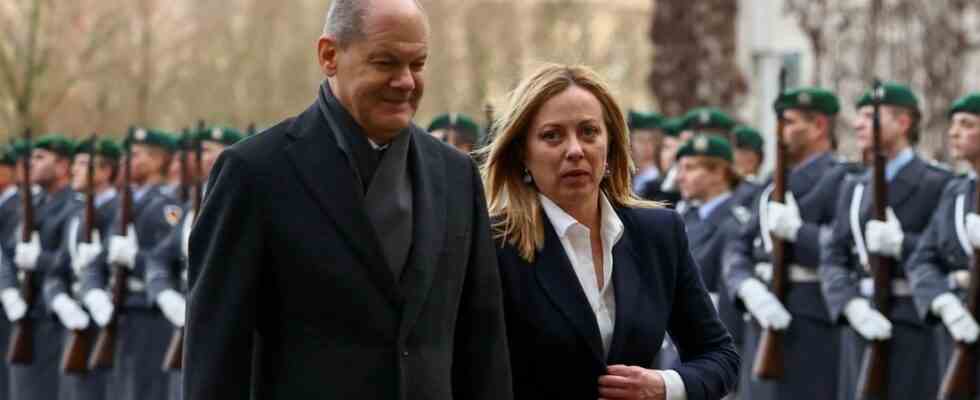In the end, at least one thing is out of the world. Giorgia Meloni is not at all allergic to Germany. The post-fascist and new Italian Prime Minister said on Friday evening that she could not remember saying it again and again, alongside Chancellor Olaf Scholz (SPD) when asked. It is true that she failed because of the German language. But that has nothing to do with allergies, but with the difficult German grammar.
For a moment, one could think that – apart from the language – nothing stands between the right-wing woman from Italy and the German social democrat, who welcomes her “warmly” to her first visit to Berlin. “Germany and Italy are very closely linked,” emphasizes Scholz, even praising Italy as Germany’s “land of longing,” something that hasn’t changed since Goethe’s time. “Our governments have always coordinated closely with each other and we are both determined to continue working closely together,” promises Scholz. If his guest’s political background bothers Scholz, he doesn’t let it show.
Or at most indirectly. He sees agreement on “questions of foreign and security policy, especially when it comes to the Russian attack on Ukraine,” emphasizes Scholz. From which it can be concluded that the agreement is less rosy in other areas. Dealing with Meloni is tricky for Scholz. On the one hand, he is expected, not least in his own party, to keep a minimum distance from the post-fascist. On the other hand, given the situation in Europe and the world, he doesn’t need another problem relationship. The chancellor agrees that the head of the far-right Fratelli d’Italia (Brothers of Italy) party, as head of government, has so far avoided turning the rest of Europe against her with radical sayings or moves, and she hasn’t backed down when it comes to Ukraine either. The problems lie elsewhere.
Scholz approaches the issue of asylum
It’s no coincidence that Meloni arrives in Berlin from Stockholm. There she coordinated with the conservative Swedish Prime Minister Ulf Kristersson – an ally for a more restrictive migration policy in the EU. Sweden currently holds the EU Council Presidency. Migration will be one of the key issues at the EU summit at the end of next week. It is crucial “that we work for a humane and crisis-proof asylum system on the basis of our common values of democracy, the rule of law and human rights,” Scholz approaches the controversial issue. It’s about “a fair balance of responsibility and solidarity”.
The goal must be “to work together with countries of origin and transit to efficiently combat human trafficking,” says Meloni. It is about “stopping migration flows before they reach the borders of Europe”. She also praises the “important relationship” that connects Germany and Italy, recalls the “strong economic ties” and is generally moderate. So how do you deal with Giorgia Meloni, who has played a very constructive role, at least in European politics?
Tangible dispute in the CSU
In the CSU, this question is causing a tangible dispute between party leader Markus Söder and his deputy Manfred Weber. Weber recently held talks with Meloni as chairman of the European People’s Party and its parliamentary group leader in the European Parliament – obviously also with the aim of exploring the possibility of cooperation after the next European elections. Söder, without agreement with Weber, ruled out formal cooperation between the EPP and Meloni and her group at a press conference in Munich on Friday. He had a long conversation with Weber about it, and a good solution was found. Apparently there can be no question of that.
Weber said that Süddeutsche ZeitungIt is good that Markus Söder recognizes that talks with the Italian government are “useful” in view of the war and the migration crisis. However, Söder did not do that at the press conference. Manfred Weber’s environment said: Söder speaks for the CSU, but Weber for the entire EPP. Cooperation with the Fratelli is currently not an issue, but should that be the case, Söder would like to get involved in the debate.

